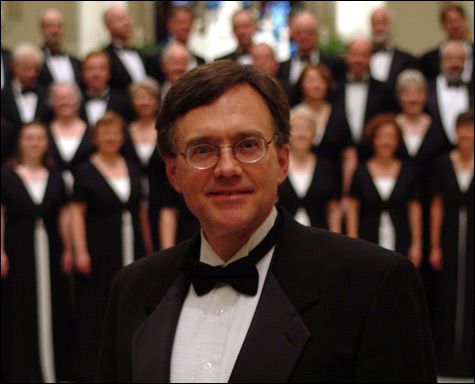
LEADING THE MASSES Choral Art Society music director Robert Russell. |
Tuesday's gift from Portland's Choral Art Society to German composer Felix Mendelssohn, on the occasion of what would be his 200th birthday, will be one of his greatest works (Elijah), and one of their biggest undertakings.CHORAL ART SOCIETY singing Mendelssohn's Elijah | March 31 @ 7:30 pm | at Merrill Auditorium, 20 Myrtle St, Portland | $15-47 | www.porttix.com| 207.842.0800 |
"This is quintessential writing for amateur choral performers," says music director Robert Russell. "In the 19th century, civic chorus was in its heyday. That's what Mendelssohn used."
The Choral Art Society performers are only technically amateurs: Russell estimates that nearly one-third of the 120-person chorus has done at least some vocal study, and all members of the chorus must audition in order to sing with the Society. "Many of these singers have long and deep experience," he says.
In addition to the skilled chorus, Russell has drawn four talented soloists together for this performance. Soprano Lisa Saffer and tenor John McVeigh, whose resumes include performances with the Metropolitan Opera, Chicago Lyric Opera, and various other prestigious organizations, both live in southern Maine. Mezzo-soprano Jennifer DeDominici, a graduate of the USM School of Music, now lives in Denver and performs regularly with the Opera Theatre of the Rockies. Nationally acclaimed bass-baritone Philip Cutlip, who performed last year with the Choral Art Society, returns this year, proving yet again that some of the nation's best classical musicians don't hesitate to come through Portland.
Russell has performed this work several times in his career, including many years ago with the Choral Art Society.
"This is the first time I will do this piece with an orchestra," says Russell, explaining that previous performances were accompanied by organ. "This will hit (the musicians) where they live. I don't think (Mendelssohn) wrote anything quite as extensive as this."
Elijah is a complex work with a dramatic story to tell. The prophet Elijah informs Ahab, the king of Israel, that there will be a severe drought because Ahab and his wife Jezebel have encouraged the worship of the Phoenician god, Baal. Elijah invites the worshippers of Baal to summon the powers of their god to set a sacrifice alight. Elijah openly mocks them when their attempts to summon Baal fail. Then Elijah asks the god of Israel to accept the sacrifice. Fire falls from the sky and the rains return, ending the drought. Elijah then orders the death of the Baal priests, which angers Queen Jezebel, who orders Elijah's death. Instead, Elijah flees to the desert, where he is sustained by the god of Israel until he is called upon for another task.
"I've always been fascinated with the story of Elijah. It is gripping drama as well as wonderful music. (Elijah) is engaging from beginning to end," says Russell.